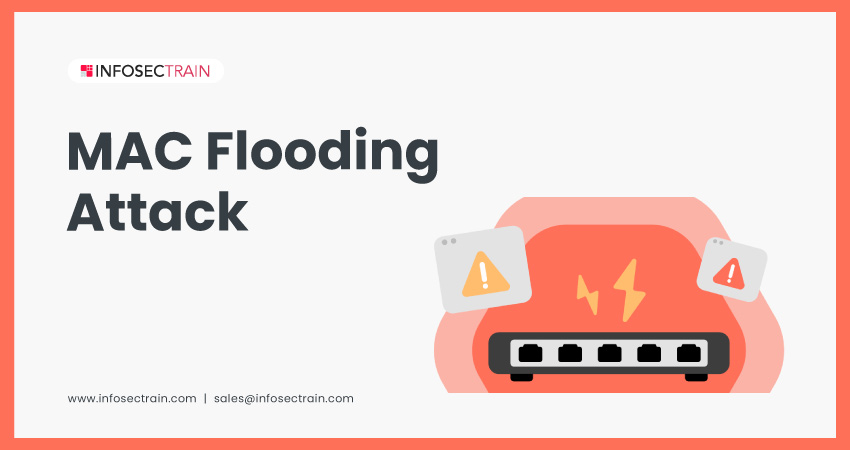MAC Flooding Attack
MAC flooding attacks have been historically prevalent but are not as common today as other attacks due to advancements in network switch technology and security measures. Nevertheless, it remains essential to be aware of MAC flooding attacks and take appropriate measures to protect your network infrastructure. It is a simple yet powerful attack that can overwhelm network switches, leading to a loss of confidentiality, integrity, and availability of network resources. It is a form of DoS attack where the attacker floods the network with a large volume of traffic to exhaust network resources.

This article will describe what a MAC Flooding attack is, how it works, and what prevention techniques are used in this attack.
What is a MAC Flooding attack?
A MAC flooding attack, also known as a MAC table overflow attack, is a type of network security attack that targets network switches. It involves overwhelming a switch’s MAC address table by flooding it with a massive amount of spoofed Ethernet frames, each containing a unique source MAC address.
MAC address: A MAC (Media Access Control) address is a unique identifying code allocated to a network device or Network Interface Card (NIC) by the manufacturer for communication on a network. It is a 48-bit hexadecimal number typically represented as six groups of two hexadecimal digits, for example, 00:1A:54:72:64:B7.
MAC address table: A MAC address table, also known as a CAM (Content Addressable Memory) table, is a database that maps MAC addresses to switch ports, enabling the switch to forward frames to the correct destination.
Ethernet frames: Ethernet frames are the primary data units transmitted over Ethernet networks. They contain the source and destination MAC addresses, payload data, and control information, allowing communication between devices within a Local Area Network (LAN).
How does MAC Flooding work?
MAC flooding works by sending a flood of spoofed Ethernet frames with different source MAC addresses to overwhelm a network switch’s MAC address table. Once the table is full, the switch goes into fail-open mode and behaves like a hub instead of a switch. In this mode, the switch broadcasts all incoming traffic to all ports, regardless of the destination MAC address. As a result, the attacker can intercept and monitor all network traffic passing through the switch, compromising the network’s security and privacy.
How to prevent MAC Flooding attacks?
Managed switches are commonly used as a preventive measure against MAC flooding attacks. They provide advanced features and configuration options to help mitigate and defend against such attacks. Some of the key features in managed switches that aid in MAC flooding prevention include:
- Port security: Implement port security features on network switches to restrict the number of MAC addresses allowed on each port.
- MAC address filtering: Configure switches to permit only specific MAC addresses on each port. It can restrict unauthorized devices from connecting to the network.
- Network monitoring: Implement network monitoring tools and Intrusion Detection Systems (IDS) to detect and alert unusual patterns of MAC address traffic behavior.
- Network segmentation: Divide your network into VLANs (Virtual Local Area Networks) to segregate traffic and limit the impact of a MAC flooding attack.
How can InfosecTrain help?
Pursuing InfosecTrain‘s Certified Ethical Hacker (CEH) and Network Security training courses can be the best starting place to learn about MAC flooding and other network security concepts. The courses are specifically designed to equip individuals with knowledge of MAC flooding attack techniques, which enables them to understand its mechanics, identify vulnerabilities, and implement countermeasures to safeguard networks from such exploits.
TRAINING CALENDAR of Upcoming Batches For CEH v12
| Start Date | End Date | Start - End Time | Batch Type | Training Mode | Batch Status | |
|---|---|---|---|---|---|---|
| 02-Jun-2024 | 13-Jul-2024 | 09:00 - 13:00 IST | Weekend | Online | [ Open ] | |
| 06-Jul-2024 | 11-Aug-2024 | 19:00 - 23:00 IST | Weekend | Online | [ Open ] |




 1800-843-7890 (India)
1800-843-7890 (India) 
